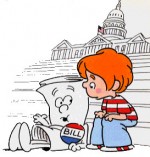
N.C. Republican legislators are beginning to push for a law that could help pay for some North Carolina students to attend private or home schools beginning from kindergarten and going through the 12th grade.
Paul Stam, of Apex, N.C., the G.O.P. leader in the state House, is behind the proposal, which would allow any married couples earning no more than $100,000 in taxable income and any single parent making no more than $60,000,to receive a refundable tax credit of up to $2,500 plus an additional $1,000 from their county to offset some of the higher private school costs and to help with homeschooling costs.
The problem, according to News & Observer, is that the only students who would be eligible under the new bill would be ones who leave a public school system. In the program’s first five years, a student could qualify for the private school aid only after spending at least a year in a public school system and, after that, according to Stam’s proposal, eligibility would be for students who spend at least one semester in a public school
This proposed legislation is rising as some Republican Party members are making way for more charter schools. Under current legislation, charter schools do not receive construction money or much other state funding, so the new legislation could make the eligible for construction funds from the N.C. state lottery.
According to News & Observer, Stam said his “tax-credit idea would cover two broad areas: saving money, and providing more choices.”
Legislative staff research says the overall savings to the state and counties combined could top $50 million per year by shifting some students out of public schools. They also estimate this program could generate 8,000 to 15,000 participants each year.
This idea is generating a fierce debate about school choice and funding and could possibly lead to a veto from Governor Beverly Perdue. Another argument against this legislation is that it will pull students out of public schools.
In an interview, Sheri Strickland, N.C. Association of Educators President, said eroding the K-12 schools is not what taxpayers want.
“Taxpayers consistently have said they want their money going to public schools instead of private ones and that there will be less accountability on how students are educated,” said Strickland.
Private school tuition averages $5,000 or more for K-8 and can be double that and more for private high school. Some private schools can be as much for one year of college beginning in middle school.
“It’s the people who can already afford to make the choice who will have the choice,” Strickland said. “It will probably be our upper- and middle-class parents, economically, who could take advantage.”
Stam said he wishes all private school students could be eligible for the assistance, but the state couldn’t afford that subsidy, according to the News & Observer.
Sue Nations, Superintendent of Jackson County Public Schools, said she was not sure how it would affect Jackson County Schools or if it would be passed, but she knows that N.C. voters have traditionally been opposed to vouchers and she has concerns about who is overseeing the private school system and to whom the home schools are responsible to.
Nations said, “There has to be accountability. What is the assurance that the kids will get education that would allow them to compete with the 21st century other students? How do you know the kids are getting a good quality education? These issues are real and need to be addressed. I think it’s important that all kids have a quality education. The public school system is open and transparent and has measures to demonstrate tests and curriculum.”
There are many concerns against the bill and as it is moving through the House right now, all N.C. school systems will be awaiting the verdict of the bill. Legislative researchers did estimate there is roughly 160,000 students attending private schools and charter schools and being home schooled in North Carolina now. If the bill does pass, could we see a fall in public school attendance and quality of student education.






